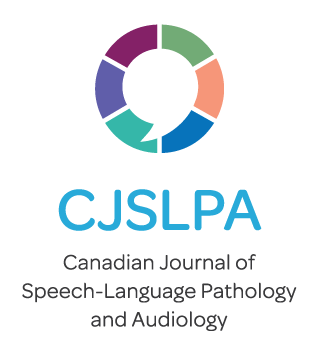

| Author(s) |
Claudette D’Souza Elizabeth Kay-Raining Bird Hélène Deacon |
| Volume | 36 |
| Number | 1 |
| Year | 2012 |
| Page(s) | 18-39 |
| Language | English |
| Category | |
| Keywords | |
| Abstract |
An online survey of speech-language pathologists (S-LPs) in Canada was conducted to determine the state of S-LP service delivery to linguistically diverse clients. Data from 384 respondents from across Canada were analyzed. Results indicated that a majority of S-LP respondents provide services to linguistically diverse clients; however, more than half provide services only in the language(s) they, the clinicians, speak. Several barriers to service delivery were identified as pervasive including not speaking the language(s) of their client; limited access to clinicians who did speak their client’s language(s), and limited access to several key supports and resources for overcoming some of these barriers such as interpreters or assessment tools in the client’s language(s). Clinicians who spoke two or more languages reported assessing and treating clients in all the clients’ languages more often than did monolingual English clinicians. As well, more monolingual English respondents than speakers of two or more languages reported that not speaking the clients’ language(s), not having access to interpreters, and a lack of knowledge about second language acquisition were barriers to appropriately assessing and treating linguistically diverse clients. Comparisons to data from surveys conducted in the United States (U.S.) found few differences between findings in the U.S. and findings in Canada except that a higher percentage of Canadian S-LPs reported using dynamic assessment, naturalistic observations, and language sampling. Results from this study emphasize the need to increase the number of bilingual S-LPs in Canada and to increase S-LP access to supports and resources relevant to a linguistically diverse clientele. Nous avons effectué un sondage en ligne auprès d’orthophonistes du Canada afin de déterminer l’ampleur de la prestation de services en orthophonie à des clients locuteurs de langues diverses. Nous avons analysé les données fournies par 384 répondants provenant de partout au Canada. Les résultats indiquent que la majorité des orthophonistes ayant répondu offrent des services à des clients parlant diverses langues; toutefois, plus de la moitié n’offrent des services que dans la langue qu’ils (les cliniciens) parlent. Plusieurs obstacles entravant la prestation de services ont été notés comme étant significatifs, y compris ne pas parler la langue de leurs clients; un accès limité à des cliniciens parlant la langue du client, et un accès limité à plusieurs appuis clés et ressources pour surmonter certains de ces obstacles, par exemple des interprètes ou des outils d’évaluation dans la langue du client. Les cliniciens parlant deux langues ou plus ont indiqué qu’ils évaluaient et traitaient toutes les langues des clients plus souvent que les cliniciens parlant seulement l’anglais. De plus, un plus grand nombre de répondants unilingues anglais que de répondants locuteurs de deux langues ou plus ont indiqué que de ne pas parler la langue des clients, de ne pas avoir accès à des interprètes et d’avoir un manque de connaissances concernant l’acquisition d’une langue seconde constituaient des obstacles entravant leur capacité d’évaluer et de traiter de façon appropriée leurs clients locuteurs de langues diverses. Une comparaison de données recueillies lors de sondages menés aux États-Unis a révélé peu de différence entre les résultats aux États-Unis et ceux au Canada, sauf qu’un plus grand pourcentage d’orthophonistes canadiens ont indiqué utiliser l’évaluation dynamique, l’observation naturaliste et les échantillons de langage. Les résultats de cette étude mettent en lumière le besoin d’accroître le nombre d’orthophonistes bilingues au Canada et d’améliorer l’accès des orthophonistes aux appuis et aux ressources pertinents pour travailler auprès d’une population avec une grande diversité linguistique. |
| Record ID | 1091 |
| Link | https://cjslpa.ca/files/2012_CJSLPA_Vol_36/No_01_1-87/D_Souza_Kay-Raining_Bird_Deacon_CJSLPA_2012.pdf |
CJSLPA is an open access journal which means that all articles are available on the Internet to all users immediately upon publication. Users are allowed to read, download, copy, distribute, print, search, or link to the full texts of the articles, or use them for any other lawful purpose.
CJSLPA does not charge authors publication or processing fees.
Copyright of the Canadian Journal of Speech-Language Pathology and Audiology is held by Speech-Language and Audiology Canada (SAC). Appropriate credit must be given (SAC, publication name, article title, volume number, issue number and page number[s]) but not in any way that suggests SAC endorses you or your use of the work. You may not use this work for commercial purposes. You may not alter, transform, or build upon this work.